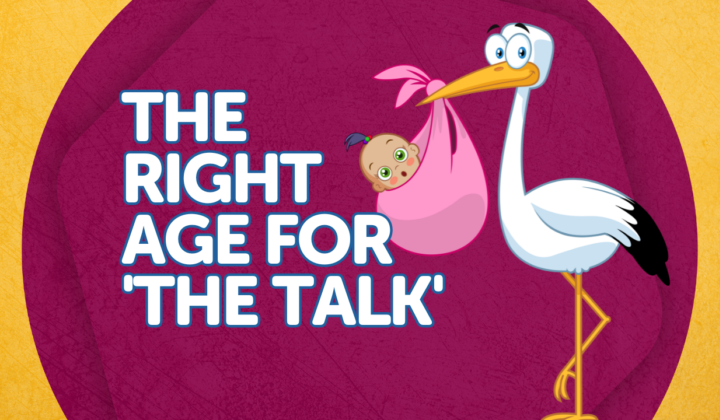Learn more about the journey that led to us equipping kids to carefully evaluate every idea they encounter.
Meet members of our team who have contributed to curriculum development.
Hear from real users of the Foundation Curriculum.
Learn what we believe about God, Jesus, Scripture, and more.
How to Explain "You Shall Not Commit Adultery" to Children
Hello, friends! Today's podcast question is short and sweet: How do you explain the commandment "you shall not commit adultery" to children?
This is a really important question for us to think through because this is one of the Ten Commandments, and we need to consider how we can explain this to children—even young children. That's the question we're going to dive deep into today on the Foundation Worldview Podcast, where we seek to answer your questions so that you can equip the children God has placed in your care to carefully evaluate every idea they encounter and understand the truth of the biblical worldview. I'm your host, Elizabeth Urbanowicz, and I'm thrilled that you've joined me for this episode today.
A Classroom Story That Changed Everything
As I was thinking through this question of how we explain "you shall not commit adultery" to children, I remembered a story from probably around my sixth or seventh year of teaching. I was going through the Ten Commandments with my students, and there was this one little boy in my class—he was really cute and sweet, but he was kind of out to lunch most days. He was sitting in the back of the rug where the kids were gathered, and we were going over the Ten Commandments when he started raising his hand with a lot of fervor. He very rarely raised his hand, so I called on him.
He said, "My mom broke one of the Ten Commandments."
I responded, "Well, yes, all of us have broken many of the Ten Commandments because we are sinful and we are not perfectly able to keep God's law."
But then he kept going. He said, "Yeah, my mom committed adultery."
I was like, "Oh my gosh." A bunch of kids immediately asked, "What's adultery?" So I said, "Okay, we're going to stop this conversation right now. We're not going to talk about all the sins of our parents." I shut down the conversation, and we did not explain what adultery was that day since the boy had specifically said that about his mom. The poor mom—I have no idea whether or not that was true, but I was like, "We're shutting down this conversation right here."
Why Early Sex Education Matters
When we think through explaining this commandment to our children, I think this is a really great example of one of the many reasons why it's so important to begin talking with our children about sex at a young age. If our children don't have a basic understanding of what sex is by the time they're five or six years old, there are so many things in life that are going to be difficult. Not only is the culture most likely going to get to them before we do with understanding what God's good design is, but even reading Scripture with kids becomes hard because there are so many times that sex or sexuality is mentioned in Scripture.
So if you have children who are eight or under and you have not yet checked out our "The Talk"...Made Easy series, I highly recommend you do that. It's a quick three-lesson video series. Each lesson is ten minutes or shorter. The first video talks through the basics of male and female anatomy in developmentally appropriate and theologically sound terms. The second video goes through the basics of sex and what sex is, and the third goes through the basics of reproduction. I highly recommend you check out that series.
If You've Already Started the Conversation
If you have already begun talking with your children about sex, explaining what adultery is becomes super simple. First, remind your children that sex is the act that seals the marriage covenant—that God has given sex as the symbol that seals the marriage covenant. Then explain that committing adultery is when someone who is married has sex with someone who is not their spouse. Simple terms: committing adultery is when someone who is married has sex with someone who is not their spouse.
Then you can talk through how this is a sin against God, a sin against the spouse, and a sin against the person they are having sex with, because it's breaking the promise they made to God and to their spouse. They're enacting that promise of marriage with someone they have not made that promise to. So it's a very simple way to explain it to children.
If You Haven't Started the Conversation Yet
If you have not yet begun to talk with your child about sex—which I highly recommend you do as soon as possible if your child is four or older—here's what you can do. If you have not yet had the first of many sex talks with your children, you can say what I used to say in my third-grade classroom. As the teacher, I was not authorized to talk about sex with my students—that was the role of the parents.
So what I would say in my third-grade classroom is: "Committing adultery is breaking the promise of marriage." The way I would explain it is this: "In marriage, a man and a woman promise to love one another and care for one another in a way that they do not love or care for anyone else, and they promise to do this for as long as they're both alive." So I would explain that that's what the promise of marriage is. Then I would say that adultery is when one person starts loving and caring for another person in the way that they promised to only love and care for their spouse.
I hope you can see from this explanation that you can have this conversation with your children whether or not they're aware of what sex is. However, it's so much easier to have this conversation when your child already understands the very basics of what sex is—that it's the sign and seal of the marriage covenant.
Showing God's Goodness in His Commands
As we're thinking through explaining this commandment, we need to remember that any time we're explaining a command of God to our children, we always want to help them see God's goodness and his kindness toward us in giving this command. There's a passage of Scripture, Psalm 19, that talks about God's commands and how they are so good.
Psalm 19:7-11 reads: "The law of the Lord is perfect, reviving the soul. The testimony of the Lord is sure, making wise the simple. The precepts of the Lord are right, rejoicing the heart. The commandment of the Lord is pure, enlightening the eyes. The fear of the Lord is clean, enduring forever. The rules of the Lord are true and altogether righteous. More to be desired are they than gold, even much fine gold; sweeter also than honey and drippings of the honeycomb. Moreover, by them is your servant warned; in keeping them there is great reward."
This passage makes clear that God's rules are always good—they're always for our good. This makes sense because God's law stems from his character, and God is good.
We want to help our children see this specifically in regard to God's rules about sex. In this case, we want to talk with our children about how God is the faithful covenant keeper—that God always keeps his promises. If you've taken your children through our "Attributes of God" curriculum, your children will already know this attribute of God. You can talk about that—that God is faithful, God always keeps his promises—and then talk about how he has called us to reflect him well to others by being faithful in the covenants that we make. When a husband and wife stay faithful to one another, they are reflecting God's covenant faithfulness.
If you've taken the children in your care through our "God's Good Design" curriculum here at Foundation Worldview, you can remind your children that marriage is a picture of Christ and the church. You can go through some of the same activities that we covered in that lesson and then talk through how when a husband or wife commits adultery, they're distorting that picture of the gospel. If a husband commits adultery, he is not portraying a picture of Christ sacrificially loving his bride, the church. If a wife commits adultery, she is not portraying a picture of the church submitting to the loving leadership of Christ.
We want to help our children see how God's commands are always for our good.
Join Our Community and Continue Growing
That's a wrap for this episode! If navigating these crucial conversations with your children resonates with you, I'd love for you to join our email community. We regularly share practical resources, biblical insights, and encouragement specifically designed to help Christian parents like you tackle the tough questions your children are asking. You won't want to miss our upcoming content on building a strong biblical foundation in your home. Sign up at foundationworldview.com to stay connected and equipped for the journey ahead.
If you have a question that you would like for me to answer on a future Foundation Worldview podcast, you can submit that question by going to foundationworldview.com/podcast.
As we leave our time together, my prayer for you is the same as always: that no matter the situation in which you and the children God has placed in your care find yourselves, you would trust that God is working all things together for your good by using all things to conform you more into the image of his Son. I'll see you next time.
Related Posts and insights

Talking to Older Kids About Sex
Today's podcast question says, "When talking to parents of older kids who have not yet talked to their kids about God's good design for sex, what advice would you give them?"

The Right Age for 'The Talk'
Today's podcast question says, "What is the right age to talk to my children about sex and the truth on the topic of how babies are born? I do not want my children to find out from others."

Can The Sex Talk Spoil Innocent Crushes?
Can having the sex talk with younger children give them ideas that could impact what would normally be an innocent crush? In this episode, Elizabeth Urbanowicz responds to the fears of having the sex talk too early with children and discusses the importance of building a healthy biblical view of others as image bearers of God.



